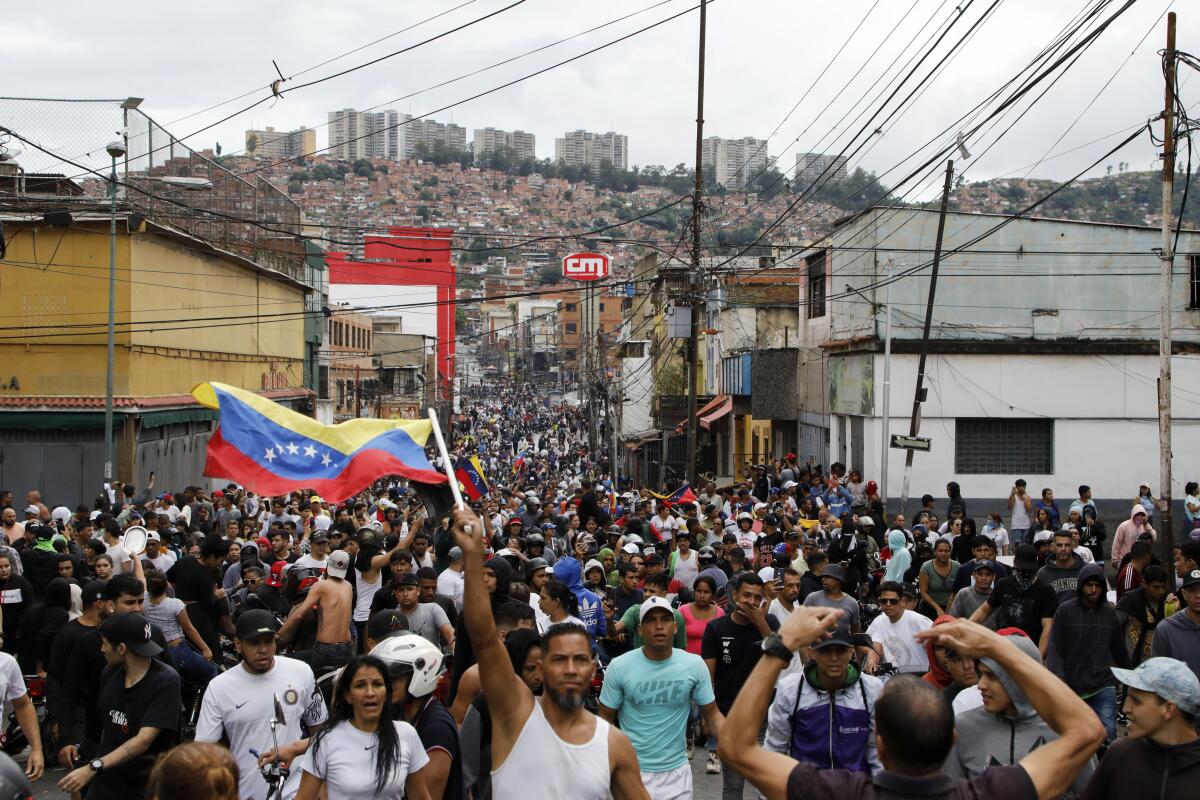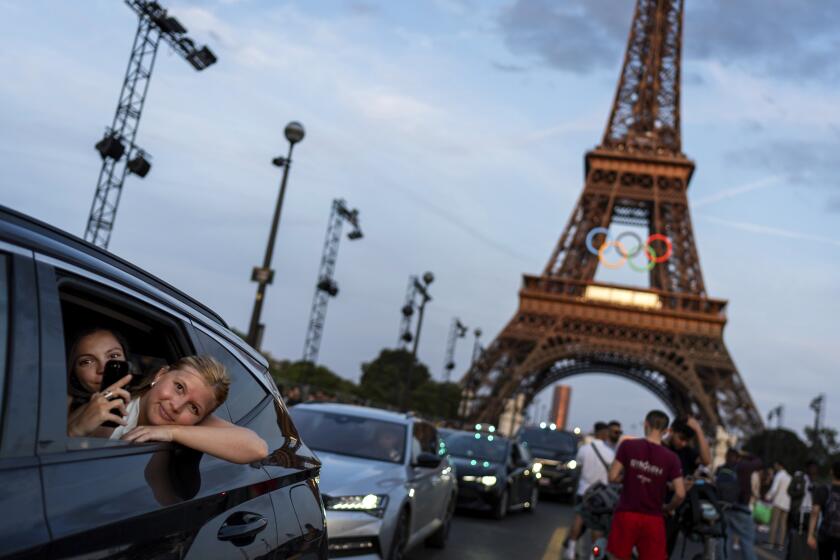Newsletter: Venezuela’s warning to the U.S.: Don’t elect dictators

Good morning. I’m Paul Thornton, and it is Wednesday, July 31. Here’s what’s happening in Opinion.
A little more than a week ago, Latin America scholar Will Freeman warned in an L.A. Times op-ed article that an electoral victory by the far-left autocratic Venezuelan President Nicolás Maduro would “require massive fraud,” given consistent polling that showed the incumbent losing to opposition candidate Edmundo González by about 30 percentage points. Since then, it appears we’ve seen what such fraud looks like — and have been given a warning of what happens when an extremist, anti-democratic political faction controls the governing apparatus of a country, from poll workers to judges and other top officials.
Maduro has maintained a near-absolute grip on power in Venezuela since 2013, when he inherited that country’s presidency from Hugo Chávez, who died after serving since 1999. After initially winning in free and fair elections, Chávez set himself up to be leader for life. Over the last quarter of a century, economic and political upheaval has resulted in a migration crisis, with more than 8 million Venezuelans leaving (many of them for the United States), and many more said they would leave if Maduro won this election. In his op-ed article, Freeman noted the political implications for the U.S. if the election in Venezuela results in further waves of desperate migrants arriving at our border.
We may get another wave, but not because Maduro “won” — if winning means he earned more votes that his opponent.
Rather, this is what appears to have happened, based on multiple reports: On Sunday night, Venezuela’s National Electoral Council, nearly all of whose members are under international sanctions for subverting democracy and human rights, declared Maduro the winner, despite many opposition observers being denied their legal right to get ballot tallies from individual polling stations after voting ended. The official vote count released by the electoral council differed so widely from preelection and exit surveys that the head of Edison Research, an American polling firm that conducted an extensive study of Venezuelan voters on election day, called the result “silly.”
In other words, this wasn’t a simple polling error, similar to the 2016 U.S. election. This was almost certainly fraud.
Sadly — but predictably — Venezuela finds itself in yet another political crisis spawned by a leader who refuses to give up power when the voters no longer wish him to have it. Past uprisings in that country have resulted in violent repression and deaths, in addition to the migrant exoduses to neighboring countries and the U.S.
This is what happens when dictators gain power — the people eventually tire of their control, but the dictators never do. In the U.S., we recently had a presidential candidate tell supporters to vote him in now, and in four years “you won’t have to vote anymore.” This is a candidate who would be swept into office with a plan to dramatically remake the federal government as an arm of one party, replacing nonpartisan civil servants with political foot soldiers whose first loyalty is to their leader.
Right now in Venezuela, we’re seeing what happens when an entire governing system is structured to serve one leader. The people resisting it deserve more than our support — they deserve to be taken as a warning to voters in the U.S.
Planning to protest at the DNC in August? Don’t. Political scientist Peter Dreier and historian Maurice Isserman say they will not heed the call to protest Israel’s war in Gaza at the Democratic National Convention in Chicago, despite their support for an immediate cease-fire. They worry about a repeat of 1968, when demonstrations against the Vietnam War at the DNC (also in Chicago) bolstered the campaign of Republican Richard Nixon, who prolonged the war well into the next decade.
Want to convince a conspiracy theory believer they’re wrong? Don’t start with the truth. Journalist Jesselyn Cook acknowledges that it seems sensible to respond to the crazed conspiracy theories about Satan-worshiping, child-eating Democrats with simple facts. Many believers need those outrageous lies to make up for deficiencies elsewhere in their lives. Cook writes, “We need to focus on the cause, not the symptom — to look past the lunacy and probe the roots of our collective vulnerability — because none of us is as immune as we would like to think.”
Enjoying this newsletter? Consider subscribing to the Los Angeles Times
Your support helps us deliver the news that matters most. Become a subscriber.
With Supreme Court reform ideas, Joe Biden is playing the long game. The president’s proposals on ethics rules, an 18-year term limit for justices and a constitutional amendment on presidential immunity have no chance of passing anytime soon. But by proposing his ideas now, Biden is turning the most unpopular Supreme Court in recent history into a campaign issue, which can eventually result in a popular mandate for reform, writes Harry Litman.
No A/C for Olympic athletes in Paris? Good intention, but bad idea. There’s something to admire about French attitudes toward air conditioning, which many Americans seem to regard as their God-given right. But Olympic athletes are different creatures, and they deserve to rest in cool comfort as they compete in Summer Games held during the planet’s hottest period on record. “We hope future Olympics, including the 2028 Summer Games in Los Angeles, find the right balance by expanding on Paris’ commitment to sustainability and climate action but not becoming so doctrinaire that the efforts backfire,” writes The Times’ editorial board.
More from opinion
From our columnists
- Robin Abcarian: Can Kamala Harris and an army of “childless cat ladies” overcome Republicans’ sexism?
- LZ Granderson: Chatter about Josh Shapiro as Harris’ running mate veers into antisemitism
From guest contributors
- A homecoming tale from a MacArthur “genius” resists tropes of immigrant life
- How humans’ loneliness epidemic extends to other species and natural phenomena
- Tourists have made Europe a nightmare. I was part of the problem but won’t be again
From the Editorial Board
- Huntington Beach’s deals with Pacific Airshow stiff the public one way or another
- California’s cannabis regulator is failing the legal marijuana market
Letters to the Editor
- “Dumb as a rock” is all the Trump campaign has on Harris? What a joke
- The simple, selfish reason Silicon Valley billionaires support Trump
- How dare Benjamin Netanyahu mock American protesters
Stay in touch.
If you’ve made it this far, you’re the kind of reader who’d benefit from subscribing to our other newsletters and to The Times.
As always, you can share your feedback by emailing me at paul.thornton@latimes.com.
A cure for the common opinion
Get thought-provoking perspectives with our weekly newsletter.
You may occasionally receive promotional content from the Los Angeles Times.




